|
|
|
driving on an abscessed tooth
Saturday, October 8 2005
setting: Reef Hotel, Eilat, Southern Isræl
The coffee machine in the Reef Hotel's basement dining room didn't work this morning, and only later did I find out why. It seems that when one would normally push the coffee button on the machine, a process starts up that would, if it happened on Shabbat, be a violation thereof. So that function is disabled during Saturday breakfast as a kind gesture that helps keep hotel guests from being consigned to Jewish Hell.
In its lobby, the Reef Hotel thoughtfully provides an internet-connected computer for the use of its guests. Today, however, that computer's internet connection was down, and the guy at the counter had no idea what to do about it. It seemed unlikely anyone was going to fix it on Shabbat, at least not before we hit the road. But how could we hit the road? The directions to Dina and Gilad's apartment in Tel Aviv, our next destination, had been emailed to Gretchen's Yahoo account. What to do? Well, if you're like Gretchen, you just give Dina a call. But if you're like me, you volunteer to do a little free vacation computer work. As I've said before, the distinction between vacation and non-vacation is often whether or not I am being paid. I quickly determined that the problem was in the router, but where was that? The desk guy opened up a back room crammed full of wires and strange equipment, most of which seemed to relate to the hotel's Byzantine phone system. But there it was, a cable modem. Still, where was the router? An ethernet cable from the cable modem went off through a wall to another room.
It's amazing the sort of license you get when you demonstrate professional competence and an air of knowing what you're doing. There I was, in the holy of holies so to speak, unplugging equipment and plugging it back in again. The desk clerk had met me ten minutes before, I'd shown no identification, and here he was trusting me with stuff that boggled his mind. In a few minutes I had the computer connected to the internet again, and I'd even given the desk clerk a crash course in how to fix the internet connection should it fail again. And then, like Clint Eastwood, I rode off into the setting sun.
Actually, the sun was still rising as we drove up over the granite mountains to the west of Eilat. We were taking an alternative route to Mitzpe Ramon to see some landscapes that had impressed Gretchen's father during a recent birding expedition. Like everywhere else in this part of Isræl, it was beautiful but bleak. It was even bleaker than usual because there were almost no other cars on the road and nearly every manmade structure appeared to have been constructed out of concern for the proximity of possibly hostile Egyptians. Those Egyptians haven't actually been hostile since the Carter administration, but grudges in this part of the world tend to be multigenerational.
Heading northwestward, I noticed the military checkpoints more because the troops manning them were paying more attention the the vehicles heading in our direction. Suicide bombers wouldn't be driving from the populated northwest to the unpopulated southeast, but it's possible they might be going the other way, particularly if they'd managed to sneak across the the borders from Jordan or Egypt. We didn't fit a suspicious racial profile, so the worst we got was the occasional glance into our back seat. But there were cars in front of us, possibly driven by suntanned sabras, where a brief conversation was warranted.
I imagine it's a uniformly unpleasant experience to be a Palestinian (or Isræli Arab) driving around the country, since there are a lot of checkpoints and every one of them is probably an ordeal. The one major thing lacking in my vacation to Isræl has been the Palestinian perspective, so it's up to me to find a way to empathize with their plight. To them, every checkpoint must give them the feeling of living in a country occupied by a foreign army. This is not to say that there's an obvious alternative to checkpoints. Perhaps the only fair solution is to have everyone undergo the same ordeal at every checkpoint so that all Isrælis (and tourists) would suffer the same inconvenience and be continually reminded of the true price of security. (I'm sure there are other indignities faced by Arabs in Isræl, but this is the one that comes to mind.)
As we drove, we listened mostly to Isræli pop music, which ranged from hip hop to alt-country, all of it sung in Hebrew. It might have just been the stations we were listening to, but I can't say I heard any rock and roll that could be described as hard, heavy, or even rockin'.
I was concerned that, since it was Shabbat, we wouldn't be able to find a gas station until Beer Sheva. But as we rolled into sleepy Mitzpe Ramon we found its main gas station open, fairly bustling with activity. There was also a guy with a very interesting combination of missing teeth manning an outdoor food stand. He was selling both Turkish-style coffee (hot water mixed with coffee grounds) and Beasley, my new favorite snackfood.
When it came time to pay for the gas (which a station attendant had been pumping) we were amazed at the expense. Three quarters of a tank of gas cost nearly $70. In Isræl every time you buy gas you're reminded that you're enriching the Saudi Royal Family.
My top right wisdom tooth must have abscessed a month or two ago, because recently a persistent sore developed on the gum adjacent to its root. This kind of sore is familiar because in the summer of 1998 I developed a similar one at the root of my "punk rock tooth" (the one smashed off at a punk rock show in Blacksburg in the Fall of 1994). I've heard horror stories about abscessed teeth, but they've caused me relatively little trouble. For example, that sore associated with my punk rock tooth persisted for two years before I got around to doing anything about it. What I'm getting to is this: my recollections of driving through the desert today are flavored with memories of sticking my finger in my mouth and massaging a ballooning swelling on my gum, then examining my finger to see if I had produced any blood. Lovely, I know.
As we entered Tel Aviv from the south, Gretchen decided we should stop in the Old City of Yafo to see, among other things, how old it really is. Oh, it's old alright, in that built-crumbled-restored-destroyed-something-else-built kind of way familiar from Jerusalem. These days it's intensively gentrifying, but the crumbly ancient bits poke out everywhere from beneath the skrim of tidyness and café mocha.
On the waterfront there's a mosque with a minaret, a reflection of the 10,000 Muslims who didn't flee the city despite all the attempts to drive them out in the back in the 1940s (when Menachem Begin was more of a terrorist than a statesman).
The oldness of Yafo in the foreground contrasts appealingly with the glittery low-rise modernity of the nearby Tel Aviv skyline. As we continued our journey northward and drove towards that skyline, I was impressed by all the new apartment buildings crowned by huge solar panels on their roofs. By huge, I mean the size of a tennis court. Prior to these, I'd seen a hundreds of individual hot water collectors (usually of the 10-20 gallon variety). The basic design is a tank on the roof (which in Isræl is usually flat or nearly so). Beside that tank and connected to it with pipes is a little 12 square foot solar collector tilted at the angle of the latitude (32 degrees). The climate in Isræl, California, Jordan, and Florida is ideal for solar energy collection, though Isræl is the only place where I've seen its widespread use. These hot water heaters are the only heating devices in many Isræli houses, which generally lack central heat (including in Jerusalem, where it does regularly freeze in the winter).
Were it not for the frontier altruism of Isrælis, Gretchen and I might still be trying to find Dina and Gilad's apartment in Tel Aviv. I kid, but only a little. This one guy we asked for directions at a traffic light actually pulled over to give us detailed instructions.
Dina and Gilad live at the top of four or five story walkup. Once you're there, though, you're surrounded by sights and sounds coming through enormous single-pane windows. This was to be my first close-up view of a Isræli solar hot water collector installation. Later, after dark, every apartment surrounding us was like another channel on a huge live-action television screen. Someone was playing a piano and it was loud enough to hear.
My first task on arrival was to fix the apartment's wireless router, which hadn't been working for weeks. There were, of course, other wireless signals coming from the neighbors, but not nearly as many as there would have been had this been a similar neighborhood in the United States. As for an Alahu Akbar signal, we were miles from the nearest access point.
Hours later, after a dinner at a hip Tel Aviv restaurant, Gretchen, Dina, and I took a leisurely stroll through the balmy night down the palm a median of palm trees past one of the largest collections of Bauhaus architecture in the world (Tel Aviv was a huge beneficiary of the Nazi-instigated German brain drain of the 1930s). It just so happens that Bauhaus architecture is a perfect match for Tel Aviv's Mediterranean climate (far better than it was for the climate in Germany, where it was developed). Tel Aviv doesn't have a long history, but it does what it can to preserve what little it has. Dina explained the characteristicaly Isræli pragmatism of the preservation effort. The deal in many places is that if renovate your building then you will be permitted to add an additional story to the roof, so long as that story doesn't clash too badly with the rest of the structure.
Our walk eventually took us to Rabin Square, the site of massive peace rallies in the early 1990s when it still seemed possible that Isræl would soon reach an accommodation with the Palestinians. Back then the square was known as Kings of Isræl square, but in 1995 Prime Minister Yitzhak Rabin, who has recently been given the Nobel Peace Prize for his role in the Oslo Accords, was assassinated on the sidewalk near the square. His assassin was Yigal Amir, a Religious Zionist opposed to Oslo.
Rabin Square backs onto a big ugly office building that looks like something you'd see in Russia in the 1990s that had been built back in the 1960s. There's a lived-in feel and impermanence to the both the building and the square, which is paved with a now-unfashionable material comprised of concrete and small round pebbles. Dina painted picture of the scenes that took place here, the huge crowds and the Peace Now! signs, and of Rabin coming to the podium to say a few words that to a modern ear sound logical and straightforward, but, like an extinct species, not the kind we're ever likely to hear again (or so the present political climate promises).
We went around the corner to the very spot where Rabin was shot. It's a corner like any other, only just a bit more dreary because of that ugly building rising up beside it. When we came to the site, we were the only people there. Into the paving stones (made from that same unfashionable aggregate just mentioned) had been placed small metal benchmarks with numbers that corresponded to a diagram of how the assassination went down. We could stand in the very footsteps of Rabin or his murderer, or in those of his coterie of mysteriously ineffectual body guards. Samples of graffiti that had appeared at the site soon after the assassination had been preserved behind plexiglass.
The whole display was all incredibly simple and understated, but this only added to its power. From a distance it was still just any street corner, but up close you could feel the ghosts still haunting those paving stones, some of which had been deliberately skewed every so slightly out of alignment with the grid defined by their neighbors.
The saddest thing about the assasination of Rabin was that it effectively marked the end of the Isræli peace process. The hardliners who didn't want to trade land for peace quickly came to dominate Isræli politics. They provoked the Palestinians with (for example) Ariel Sharon's moronic visit to the Temple Mount and not only were years lost, the clock of peace spun backwards. That's how it always is. The good guys are always the folks who end up on the bad side of an assassination: Mahatma Gandhi, Martin Luther King, Jesus Christ, Robert Kennedy, Salvadore Allende, John Lennon, Abraham Lincoln. Even when people try to assassinate the bad guys (Adolf Hitler, Saddam Hussein, Ronald Reagan), they never succeed. Hold on, I take that back. William McKinley was successfully assassinated.
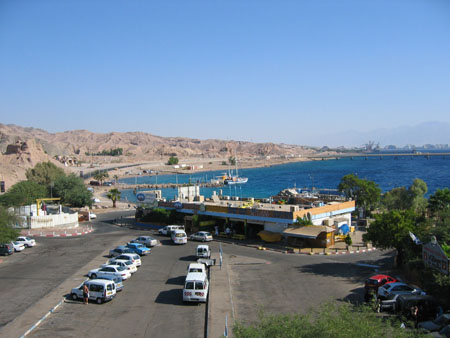
The northern tip of the Gulf of Aqaba this morning.
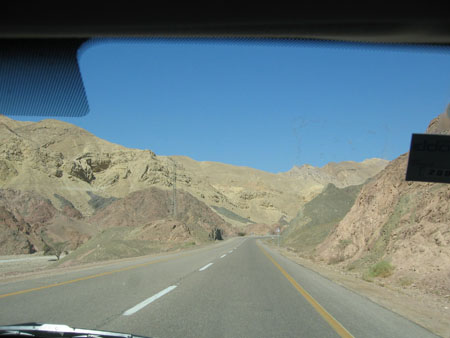
A variety of colors in the mountains west of Eilat near the Egyptian border.
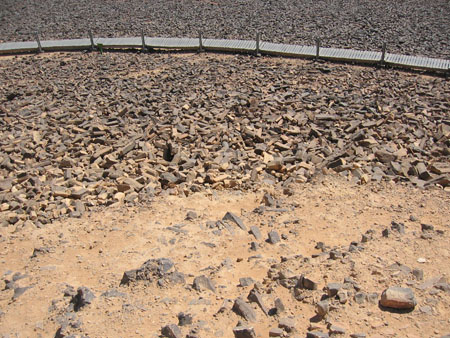
"The Carpentry" at the bottom of the Mitzpe Ramon "crater." That isn't wood, it's volcanic rock that cooled in a special way.
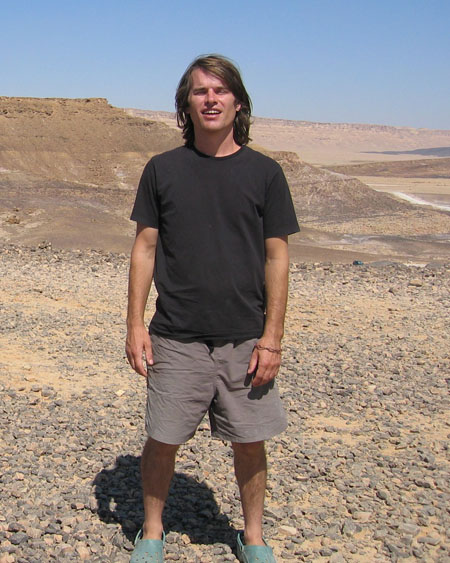
Me in the carpentry. Gretchen obviously took this picture.
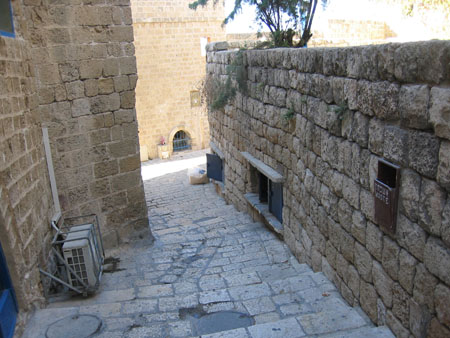
Old stone in Yafo.
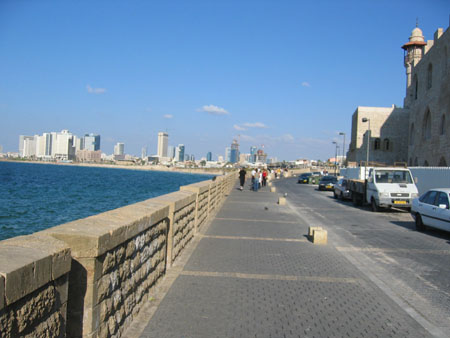
View of Tel Aviv from the Yafo waterfront.
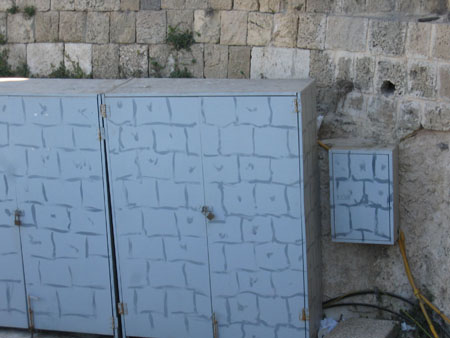
Fake stonework design on electrical panels in Yafo.
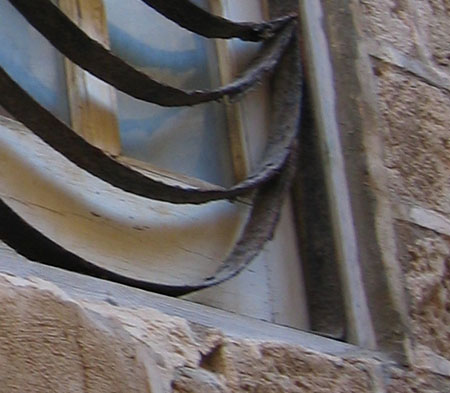
A rusty anti-burglar barricade in Yafo.
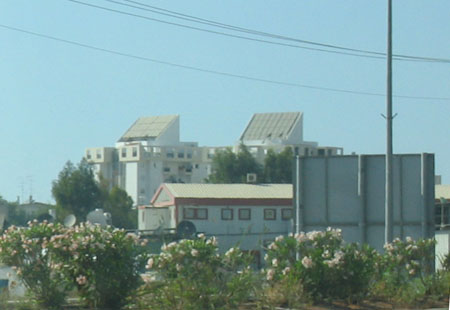
Huge solar installations on new apartment buildings in Tel Aviv.
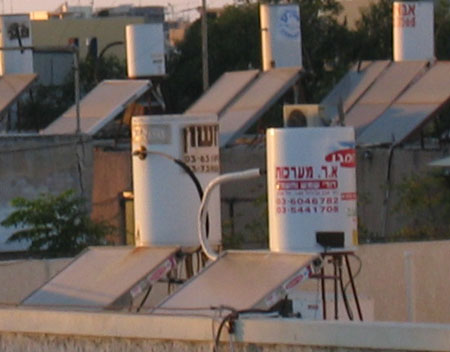
A bunch of small-scale solar water heaters, viewed from Dina and Gilad's Tel Aviv apartment.
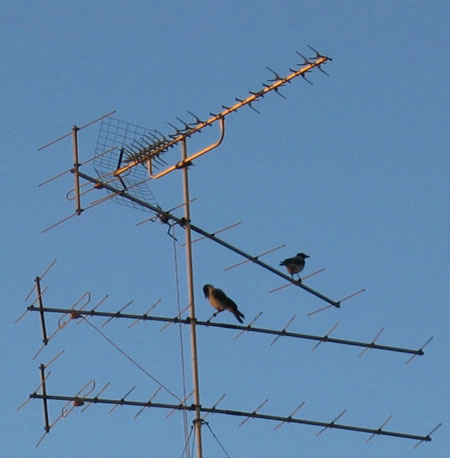
I love Yagi antennas. You can tell the frequency they're designed for by eyeballing the spacing of the elements, and here we have a couple small Isræli ravens (the kind with grey backs) for scale. All of these antennas (except for the top one) look to be tuned to about 150 MHz.
For linking purposes this article's URL is:
http://asecular.com/blog.php?051008 feedback
previous | next |










